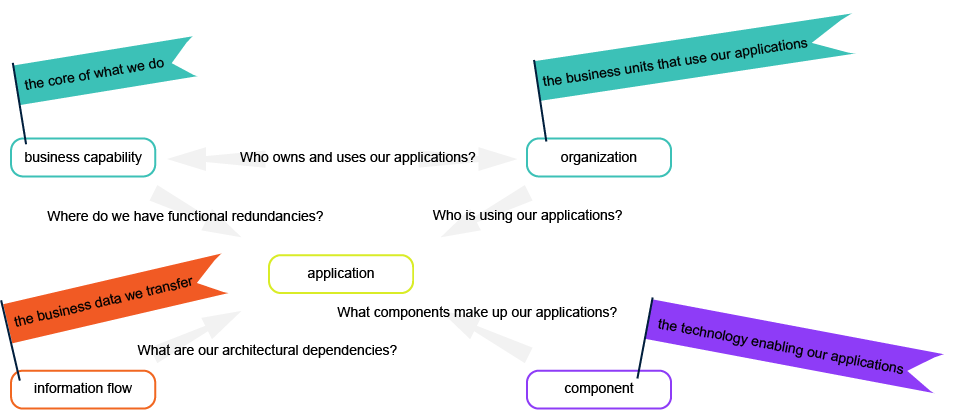Capture application data
Users with the user profiles Application Manager, Portfolio Manager, and Portfolio Admin can add and edit applications in Alfabet FastLane. Click for an overview of permission concepts.
An application is a software package that provides functionality to end users and supports the business to accomplish its mission. Applications operate on a platform made up of hardware and software components necessary to run the application. An application has a defined lifecycle and may have predecessor and successor versions.

An application supports the business by providing functionality to support the core business capabilities. The application is used by organizations to provide the business capabilities. Applications transfer business data by means of information flows. Applications are built on components that provide the technologies that enable the applications.
What's the difference between an application and component? An application differs from a component in that the application provides functionality that is used by end users. Components, on the other hand, do not typically provide functionality to end users but rather provide technical functionality to support an application. For example, applications include products like customer portals, project management systems, vacation tracking systems, or a product like SAP@CRM System. Components include operating systems, Web servers, and Web browsers, or a product like SQL Server Database Management Studio.
The application directly supports the company to realize its business capabilities and supports its business processes. Typically, users will know the application by name and the name is typically different than the name of the vendor delivering the application. An application will have its own budget.
The following table serves as an aid when trying to determine whether an object in your IT architecture is an application or a component.
| Is it an application or a component? | Application | Component |
|
Does it provide support to business capabilities or business processes |
yes |
no |
|
Does it provide business benefit on its own? |
yes |
no |
|
Does it have a service desk? |
yes |
maybe |
|
Does it have an internal name or business-related name that is known by the end user? |
yes |
maybe |
|
Can an end user work with it? |
yes |
maybe |
|
Can it be used in different applications? |
no |
yes |
|
Is it a standard IT product such as an operating system, infrastructure component, or database? |
no |
yes |
To streamline documenting your application portfolio, it is recommended that the relevant business capabilities, business processes, and organizations in your business architecture are captured in the repository before you capture your application data. Click to understand the dependencies of data capture.